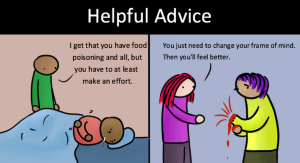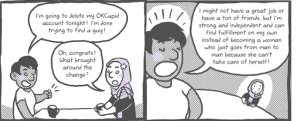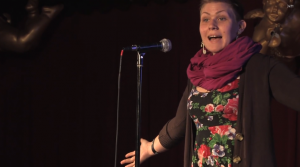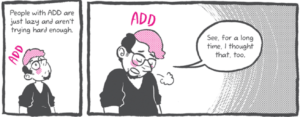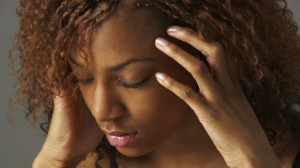
Source: The Grio
I’ve become increasingly bothered with the way that the dominant discussion about black women’s sexuality begins with enslaved black women’s experiences with white supremacy.
As a black woman, I feel like there’s this unsaid pressure that I have to limit my sexual actions and expressions simply because there are so many prevailing stereotypes about black women’s bodies.
Slavery is regularly employed as a framework to talk about black women’s sexual bodies today. To contextualize, think about the recent debates over Beyoncé-as-feminist, as well as the recent cultural panic over Nicki Minaj’s “Anaconda” album cover and music video.
Many feminist scholars and activists cited slavery – as well as the way that enslaved black women’s bodies were fetishized and hypersexualized – to understand why Nicki Minaj would show her body in such a sexualized way.
Oftentimes, this comes at a cost of black women’s sexual empowerment ironically being entirely eclipsed by slavery.
While discussions about slavery are relevant and necessary, especially because racism and sexism are still prevalent discriminatory systems today, it feels as though these discussions are being misused as the framework to understand and interpret black women’s sexualities.
When white women are sexual in the public sphere, (post)feminism(s) are brought up as frameworks to analyze these empowered, autonomous bodies. But when black women are sexual, suddenly we become descendants of slaves with confused, hypersexualized psyches.
To help understand why we need to curb this trend, here are three reasons why you shouldn’t bring up slavery every time a black woman decides to assert her own sexual autonomy.
1. The Color of Slavery Is White, Not Black
How often are white people reminded that they’re descendants of slave owners? How often are discussions about white men and women’s sexualities framed around a slavery narrative that, really, belongs to them?
If white men can sexually navigate culture freely without having to be reminded or burdened with the history of slavery and rape, why can’t black women have the same privilege?
Whenever slavery is used to discuss contemporary black bodies, the discourse usually washes white people clean from the discussion of slavery. In fact, people think of slavery in passive, rather than active, terms – as though slavery happened to Black people, rather than systemically decided on and carried out by white people.
This sounds familiar: In our language, we’re accustomed to concealing the perpetrator.
In a TEDxTalk titled “Violence Against Women, It’s a Men’s Issue,” Jackson Katz demonstrates the ways that our language – and even our questions – can burden minoritized subjects even further.
“[T]he dominant group is rarely challenged to even think about its dominance because that’s one of the key characteristics of power and privilege — the ability to go unexamined, lacking introspection, in fact being rendered invisible, in large measure, in the discourse about issues that are primarily about us. And this is amazing how this works in domestic and sexual violence, how men have been largely erased from so much of the conversation about a subject that is centrally about men.”
And this oppressive phenomenon happens here, too: The fact that our automatic cultural reflex is to talk about slavery when black women are trying to seek erotic pleasure speaks to the ways that black people are still discursively being chained to slavery.
The fact that sexualized imagery of black women by black women in 2014 immediately warrants the discussion of enslaved black women’s bodies is almost comical. The fact that black skin still reminds us of slavery – while the white, colonialist, appropriative gaze doesn’t – is part of the problem.
The only thing that connects enslaved black women and sexual black women today is the violent system of white supremacy. Therefore, if we want to make this connection at all, we should center our discussions and critical analyses on the white gaze, rather than black women’s bodies and slavery.
Beyoncé and Minaj’s curvy bodies aren’t the aftermath of slavery. However, white people attempting to define their bodies through the white gaze is.
If white colonizers thought black women’s bodies were hypersexual – and we still culturally perceive black women’s bodies as hypersexual – then who is at fault? Should black women be blamed for their bodies, or should the white gaze be blamed for its distorted framing?
Since slavery is really a story about white colonization, we should be interrogating white actions and behaviors. We should be interrogating white sexuality. We should be interrogating the ways that white people are still trying to define black bodies, generations after slavery.
2. Marginalized People Shouldn’t Have to Disprove Stereotypes Created by Oppressors
If you’re a marginalized person you probably already know what it’s like to feel the aforementioned unsaid pressure to act differently from the images that are dominant in the media about your group.
So, if you’re a black person, you might stray way from wearing baggy jeans and having your natural hair out because the media has turned these simple actions into signifiers of deviance.
Marginalized people have been disciplining themselves and their actions and self-expressions for so long to make white people comfortable. We strive not to reify the negative images that white people created and produced, so we are stuck in this endless, futile cycle of acting “differently” even though there’s nothing we can do to gain white respect.
Because white people have taken black bodies and marked them as deviant and lascivious doesn’t mean that our bodies are actually deviant and lascivious. I shouldn’t have to live my life by imaginary white rules.
On top of that, people of color shouldn’t have to disprove stereotypes that white people created! If we were to do this, we would be constrained in the ways that we’re allowed to represent or express ourselves, simply because white people called dibs on our bodies.
If you turn on white media programs, you would see images of black people as robbers, rapists, crack heads, welfare queens. However, does that now mean that in black media, we can’t make a film about a black person who is a robber simply because white people have taken that image and tried to naturalize it?
Does that mean black people can’t have a movie where the lead character is on welfare because suddenly that would mark us as cliché?
We can’t base which stories, expressions, and characters we want to portray on what white people have decided is problematic. If that were the case, our lives would be preoccupied with whiteness. We would only be allowed to project one narrow, positive black character.
We would only be allowed to showcase the “exceptional” or “magical negro” trope.
I don’t strive to be your “exceptional negro.”
The term “exceptional” or “magical negro” stems from the racist idea that certain black people who are recognized for attributes associated with excellence are different from the “regular” black folk who are usually framed with racist stereotypes of laziness, sexual deviancy, and illiteracy. And these “exceptional negroes,” through that difference, open the eyes of white folks to the notion that – gasp! – not all black people are the same.
“Exceptional negroes” are “model” minorities who are seemingly respected by white people, even though they’re not protected from racism. If you’re only being applauded because you’re not like those “other” black people, the underlying assumption is that black people are inherently bad.
Black people have to labor harder in white America to gain respect because gaining respect is associated with shedding your black skin (which is something that we can’t do).
When it comes to sexuality, there are so many white stereotypes of black deviancy, and perhaps it might be uncomfortable for white America when black women ignore your respectability politics – when they act upon their own desires, not yours.
We should be celebrating the rise of black women feeling comfortable in showing their sexual expressions, even if we want to be critical about the particular images they’re emitting.
Respectability politics can be debilitating for black women, so the last thing we should be doing is interpreting their bodies through a white slavery framework.
If you’re interpreting black women’s bodies through a white framework, our images will inevitably resemble the racist, sexist ones that white people created. That’s not our fault.
I shouldn’t have to discipline my actions simply because white people created unfounded stereotypes.
The onus of “respectability” shouldn’t be on black people, but on colonizers. I have nothing to prove to you.
3. Using the Fixed Framework of Slavery to Analyze Contemporary Black Bodies Is Too Simple
Chances are, if you have an automatic script or answer for behavior or imagery that you deem oppressive or problematic, it’s a bit too simplistic.
For example, if a woman showing her sexual body equates to automatic objectification or liberation in your book, then you need to revisit the feminist tools you’ve created for yourself.
Oppression is messy. There are no clean-cut answers. Part of the work as an activist is to acknowledge the complexity of the issue at hand, rather than reducing it into a simple, easy event. Simple answers are seductive, but they aren’t productive.
Only focusing on slavery makes it seem like we completely understand black sexuality —that we’ve done all of the necessary analysis and that there’s nothing else to add to the story. It’s a done book with all white authors. Black women’s contemporary voices don’t matter at all.
Black women are living and breathing. We are not just fleshy historical data points that you read about in textbooks. We are not your cultural reminders that slavery existed. Your ability to navigate culture freely as a white sexual subject is reminder enough that slavery happened.
We have to collectively get to a point where we culturally understand that black women experience erotic pleasure. Black women have a right to be as sexual as they want, even if it makes you uncomfortable. Black women don’t need your permission, nor do they need to explain anything to you.
You infantilize black women when you try to explain away our sexuality, as if we couldn’t possibly just have sexual needs and desires, as if our sexual bodies must be attributed to our abused psyches from slavery.
Overbearing parents do this to their children. They try to make sense of their kid’s sexual urges (especially the urges of girls) by blaming it on a pornographic culture, or maybe on the other party involved, rather than just acknowledging that their kids are sexual beings.
Why are we doing this to black women? We are not your children.
Black women don’t need to be disciplined. You don’t have the right to scold me or punish me simply because you’re uncomfortable with my body. You don’t have the right to speak over me because I’m black and you took a history course.
Being sexual while black doesn’t warrant a psychological analysis. If you can’t stop thinking about enslaved black women when you look at me and my body, perhaps that says something about you. If you can’t acknowledge that I have my own desires, I can’t imagine what else you don’t acknowledge about my personhood.
While slavery has many lasting, negative impacts, a black woman’s sexual body isn’t one of them.
[do_widget id=”text-101″]
Aph Ko is a black feminist writer and musician. She is also the creator of Tales from the Kraka Tower, a web-series that satirizes diversity in academia. Aph generally examines popular controlling images of blackness and gender in the mainstream media. Aph has a BA in Women’s and Gender Studies, and an MA in Communication/Cultural Studies. Aph is extremely sarcastic and critical, and she talks very loudly. Follow her on Twitter @Aph_Ko.
Search our 3000+ articles!
Read our articles about:
Our online racial justice training
Used by hundreds of universities, non-profits, and businesses.
Click to learn more






